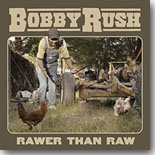 In 2007, Bobby Rush released Raw,
which was his first venture into acoustic blues
after years of his raucous brand of soul-blues
that made him a star on the chitlin circuit.
Rush’s appearance in the 2003 PBS series The
Blues widened his audience considerably and
inspired the legend to expand his sound a bit.
While he’s continued to release outstanding
albums of soul-blues he’s managed to mix things
up along the way with albums that broadened his
palate, like Raw, Folkfunk,
Down In Louisiana, and the 2017
Grammy-winning Porcupine Meat.
In 2007, Bobby Rush released Raw,
which was his first venture into acoustic blues
after years of his raucous brand of soul-blues
that made him a star on the chitlin circuit.
Rush’s appearance in the 2003 PBS series The
Blues widened his audience considerably and
inspired the legend to expand his sound a bit.
While he’s continued to release outstanding
albums of soul-blues he’s managed to mix things
up along the way with albums that broadened his
palate, like Raw, Folkfunk,
Down In Louisiana, and the 2017
Grammy-winning Porcupine Meat.
Rush’s latest release is called
Rawer Than Raw (Deep Rush Records) and
finds him revisiting traditional blues. This
time around, Rush handles all the guitar and
harmonica playing with most satisfying results.
He wrote five of the 11 tracks on the album,
including the rustic opener, “Down In
Mississippi,” featuring Rush on gravelly vocals
and energetic harmonica and guitar.
Rush’s take on Skip James’ “Hard
Time Killin’ Floor” (presented here as “Hard
Times”) is particularly inspired, with Rush’s
emphatic but spare guitar loaded with energy, as
is the funky “Let Me In Your House,” another
Rush original.
Rush next tackles Howlin’ Wolf’s “Smokestack
Lightning,” his hypnotic fretwork and vocal
asides give the song a fresh coat of paint that
makes the oft-covered tune a completely
different animal.
Rush also covers Willie Dixon
(“Shake It For Me”), Sonny Boy Williamson II
(“Don’t Start Me Talkin’”), Robert Johnson (a
spirited “Dust My Broom,” which closes the
album), and the standard “Honey Bee, Sail On,”
taken here at a slow, reflective pace that works
really well.
Interspersed with the classic
covers are a set of Rush originals, which are
never completely originals, as he takes ideas
and occasionally lyrics from older blues songs
that mesh seamlessly with the full-blown covers.
“Sometimes I Wonder” is another
slower-paced song where Rush takes his sweet
time, and the song is the better for it. “Let’s
Make Love Again” mixes the salaciousness of his
soul-blues repertoire with the downhome blues,
and Rush has previously recorded “Garbage Man” a
couple of times (most recently on the soundtrack
for the Last of the Mississippi Jukes
documentary in 2003), but it’s always a welcome
addition.
So the title of this album,
Rawer Than Raw, begs the question….. “is it
really rawer than Raw??” Well, to these
ears, it is, but what’s more impressive to me is
how Bobby Rush, who just turned 87 years old,
remains at the top of his game and unafraid of
taking chances with his brand of blues. He
completely takes over these songs with the sheer
weight and magnitude of his talent and
personality and just blows this set out of the
water. I can’t see any blues fan NOT enjoying
Rawer Than Raw.
--- Graham Clarke
 Living On Mercy (The Last
Music Company) is the first full-blown studio
album from Dan Penn in 26 years. The
legendary singer/songwriter has released a live
album (with Spooner Oldham) and several
self-produced “demo” sets in the interim, but
this set was recorded in Nashville and Muscle
Shoals with Penn offering a mix of new songs and
a few songs previously recorded by other
musicians. Penn recently turned 79, but his
voice is as warm and comfortable as they ever
were, the perfect mix of country and soul, and
his songs still touch on topics and situations
that will appeal to everyday folks.
Living On Mercy (The Last
Music Company) is the first full-blown studio
album from Dan Penn in 26 years. The
legendary singer/songwriter has released a live
album (with Spooner Oldham) and several
self-produced “demo” sets in the interim, but
this set was recorded in Nashville and Muscle
Shoals with Penn offering a mix of new songs and
a few songs previously recorded by other
musicians. Penn recently turned 79, but his
voice is as warm and comfortable as they ever
were, the perfect mix of country and soul, and
his songs still touch on topics and situations
that will appeal to everyday folks.
The title track opens the disc,
a look at aging and survival …. “more dead than
alive, but somehow I still survive, I must be
living on mercy,” the somber lyrics belying the
somewhat upbeat accompanying music that
initially pulls listeners in. “See You In My
Dreams” is a heart-rending tale of a lost love
that most people have probably lived through,
and “I Do” (co-written with longtime
collaborator Spooner Oldham) is a sweet,
sentimental ballad that would have probably been
a hit during the old FAME Records days for one
of their artists. “Clean Slate” would have been
as well, and probably could be today.
“I Didn’t Hear That Coming” is
another standout, a story of love with an
unexpected twist taken at a livelier pace, and
on “Down On Music Row” Penn relates the tale of
an ambitious songwriter arriving in Nashville
and being rejected by all comers. It's a tale
which might have a bit of autobiographical
connotation. “Edge of Love” is the hardest
rocking track on the album, with soulful horns
and Will McFarlane’s guitar work, and “Blue
Motel,” one of two songs co-written by Penn with
the Cate Brothers, tells of a meeting place for
desperate lovers (their other collaboration is
the bouncy, upbeat “Soul Connection”).
“Things Happen” was previously
recorded by Bobby Purify about 15 years ago, one
of the best tracks on his Better To Have It
album from 2005, and it’s really good to hear
Penn’s own bittersweet version, as his aching,
vulnerable vocal is pitch perfect. The gentle
gospel closer, “One of These Days,” finds Penn
pondering his final days and testifying that we
all need to get our acts together before that
day arrives.
Dan Penn is one of those musical
talents who needs to be heard by anybody who
just enjoys good music. A songwriter who sings
as well as he writes, Penn’s songs will appeal
especially to blues, soul, and even country
music fans. Buy a copy of Living On Mercy,
and while you’re at it, grab a few for your
friends who dig great music. I have to admit
that I’ve bought Dan Penn records for some of
mine over the years, and this one is no
exception.
--- Graham Clarke
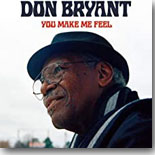 One of the nicest comeback
stories of the past few years has been the
return of soul singer/songwriter Don Bryant
to performing and recording. One of the great
songwriters of the ’60s and ’70s for Hi Records,
Bryant started out as a performer with the
label, but settled in as a songwriter. Hi
Records head man Willie Mitchell assigned him to
work with a young singer named Ann Peebles. The
pair formed a tight musical and personal bond,
marrying in 1974, but in the meantime, Bryant
co-wrote several of Peebles’ biggest
hits,.including “I Can’t Stand The Rain,” “99
Pounds,” and “Fill This World With Love.”
He also wrote songs for Al Green, Syl Johnson,
O.V. Wright, and Otis Clay.
One of the nicest comeback
stories of the past few years has been the
return of soul singer/songwriter Don Bryant
to performing and recording. One of the great
songwriters of the ’60s and ’70s for Hi Records,
Bryant started out as a performer with the
label, but settled in as a songwriter. Hi
Records head man Willie Mitchell assigned him to
work with a young singer named Ann Peebles. The
pair formed a tight musical and personal bond,
marrying in 1974, but in the meantime, Bryant
co-wrote several of Peebles’ biggest
hits,.including “I Can’t Stand The Rain,” “99
Pounds,” and “Fill This World With Love.”
He also wrote songs for Al Green, Syl Johnson,
O.V. Wright, and Otis Clay.
When Hi folded in the late ’70s,
Bryant and Peebles took a break, with Bryant
focusing on gospel music in the ’80s. When
Peebles returned to performing and recording in
the ’80s Bryant provided new songs and support,
but continued in the gospel genre. Peebles
suffered a stroke in 2012, retiring from
performing and Bryant found himself with free
time, so he began to write songs again. He was
invited to perform with The Bo-Keys on their
2016 album, Heartaches By The Number,
singing the title track. That performance
inspired Bryant to return to the studio in 2017,
when he released the excellent Don’t Give Up
On Love on Fat Possum Records. Bryant
sounded as good as he did 50 years earlier, with
several Hi alumni backing him, and the album was
one of the best of the year.
Bryant’s not done yet either,
releasing a follow-up, You Make Me Feel
(Fat Possum Records), earlier this summer. The
78-year-old sounds as good as he did on his
previous release and he’s backed by a most
impressive band, including producer Scott Bomar
(bass, keyboards, guitar, percussion), Howard
Grimes (drums), Rev. Charles Hodges (organ), Joe
Restivo (guitar), Al Gamble and Archie “Hubbie”
Turner (keyboards), and a horn section that
includes Marc Franklin (trumpet and
arrangements), Kirk Smothers and Art Edmaiston
(sax).
Bryant wrote eight of the ten
tracks, including remakes of several of his
classic hits. We hear a smoldering version of “I
Die A Little Each Day,” which Otis Clay released
in the ’70s, the gospel-flavored slow burner
“Don’t Turn Your Back On Me,” which Bryant
himself recorded in the mid ’60s, and the
irresistible “99 Pounds,” a hit for his wife in
1971.
The new songs, some co-written
with Bomar, more than measure up to the
classics. “Your Love Is To Blame” sounds like
vintage Stax/Hi-era deep soul with the horns and
the backing vocals, and Bryant’s performance on
the heartbreaker “Is It Over,” will leave a lump
in your throat. The Latin-tinged betrayal tune,
“Your Love Is Too Late,” is another standout,
and “I’ll Go Crazy” is a superb soul ballad that
also recaptures that ’70s Hi vibe (Bryant
actually recorded this one, written by James
Cross and Johnnie and Mary Frierson in the late
’60s),. The nimble “Cracked Up Over You” has a
Motown feel and “A Woman’s Touch” reads like a
sweet tribute to Peebles.
Bryant closes the albums with a
funky take on the gospel standard “Walk All Over
God’s Heaven,” returning to the music he sang
for nearly 40 years. I hear the backing vocals
of the Sensational Barnes Brothers behind Bryant
on this one, and if this joyful tune doesn’t put
a hop in your step you might want to check your
pulse. If Bryant’s gospel records are this good,
I might have to track them down.
Simply put, if you love the
vintage Memphis soul music of the ’60s and ’70s,
especially those sounds emanating from the Hi
Records studios of the era, you must……you MUST
own this album. You Make Me Feel
successfully recaptures that golden sound and
hopefully, Don Bryant will continue to make up
for lost time with more fine recordings like
this one, and it’s predecessor.
--- Graham Clarke
 Rory Block continues her
“Power Women of the Blues” series with Prove
It On Me (Stony Plain Records). Where the
first entry in the series focused on the music
of Bessie Smith (A Woman’s Soul), this
time around Ms. Block focuses on some of the
more obscure names from the early days of the
blues, with seven tunes originally recorded by
Helen Humes, Madlyn Davis, Rosetta Howard,
Arizona Dranes, Lottie Kimbrough, Merline
Johnson, and Elvie Thomas, along with a pair of
songs from more familiar names (Memphis Minnie
and Ma Rainey), plus one Block original. All
sounds on the album are from Block and her
husband, Rob Davis.
Rory Block continues her
“Power Women of the Blues” series with Prove
It On Me (Stony Plain Records). Where the
first entry in the series focused on the music
of Bessie Smith (A Woman’s Soul), this
time around Ms. Block focuses on some of the
more obscure names from the early days of the
blues, with seven tunes originally recorded by
Helen Humes, Madlyn Davis, Rosetta Howard,
Arizona Dranes, Lottie Kimbrough, Merline
Johnson, and Elvie Thomas, along with a pair of
songs from more familiar names (Memphis Minnie
and Ma Rainey), plus one Block original. All
sounds on the album are from Block and her
husband, Rob Davis.
While you may not be familiar
with some of the artists, you will know several
of the songs. Humes’ “He May Be Your Man” has
been covered by a host of artists over the
years, but Block’s lively, freewheeling version
is distinctive from the rest. Davis recorded
“It’s Red Hot” in the late ’20s with Tom Dorsey
on piano and Tampa Red on guitar, earning the
name “Red Hot Shakin’” Davis for her efforts.
Block’s version generates heat as well, and then
she adopts a more serene approach (probably most
appropriately) for Rosetta Howard’s tribute to
marijuana, “If You’re A Viper,” while the feisty
title track comes from the equally feisty Ma
Rainey’s catalog.
Arizona Dranes was a blind
gospel singer and pianist. She was one of the
first professional woman gospel singers, and the
first to play piano on a gospel record. One of
her better-known songs is “I Shall Wear A
Crown,” covered beautifully by Block who
replicates Dranes’ high-singing style. On Lottie
Kimbrough’s “Wayward Girl,” Block doesn’t
imitate Kimbrough’s voice but effectively
conveys the world-weariness of the original
song, dropping in some nice slide guitar in the
process. Memphis Minnie’s “In My Girlish Days”
gets a nice, leisurely treatment, and Merlene
Johnson’s spicy “Milkman Blues” is a lot of fun,
too. Block concludes the album with the somber
“Motherless Child,” from Elvie Thomas, with a
heartfelt vocal and mesmerizing slide guitar.
The lone original tune from
Block is “Eagles,” which she calls a “pretty
straight-ahead account from my own life.” She
delivers it in the same pre-war style as the
other nine tracks and it fits like a glove.
I have truly enjoyed Rory
Block’s tribute series, her earlier “Mentor
Series,” honoring many of the male singers she
met in her early day, and this ongoing series.
I’ve learned a lot about these artists and their
music. She is able to convey the power and
majesty of the original artists while playing
their songs, but manages to inject her own sound
into the music as well. Prove It On Me
leaves me anxiously awaiting the next volume in
the series.
--- Graham Clarke
 The Bucks County Blues Society
in Pennsylvania was established in 1977, and is
recognized as the oldest blues society in the
country. Since the early ’80s, they have hosted
a Spring Fever Footstomper, which was launched
in 1981 with Luther Allison as headliner. The
Killer Guitar Thriller series started in 1983
with Matt “Guitar” Murphy as feature attraction.
In 2019, Vermont singer/guitarist Dave Keller
journeyed southward with his band (Alex
Budney – bass, Jay Gleason – drums) for the
festival and nearly blew the roof off the old
Edgely, Pennsylvania VFW building.
The Bucks County Blues Society
in Pennsylvania was established in 1977, and is
recognized as the oldest blues society in the
country. Since the early ’80s, they have hosted
a Spring Fever Footstomper, which was launched
in 1981 with Luther Allison as headliner. The
Killer Guitar Thriller series started in 1983
with Matt “Guitar” Murphy as feature attraction.
In 2019, Vermont singer/guitarist Dave Keller
journeyed southward with his band (Alex
Budney – bass, Jay Gleason – drums) for the
festival and nearly blew the roof off the old
Edgely, Pennsylvania VFW building.
Earlier this year, Keller
released the set on his Tastee-Tone Records,
Live at the Killer Guitar Thriller. It’s a
strong 15-song set that mixed original tunes
from Keller with a bevy of select covers. Four
of the songs are among the best tunes from
Keller’s then-recent Catfood Records release,
Every Soul Is A Star --- the soulful title
track, the funky rock-edged “Don’t Let Them Take
Your Joy,” the upbeat love song “It’s All In
Your Eyes,” and “Kiss Me Like You Miss Me,” a
song Keller tells the audience was inspired by
his mentor, Johnny Rawls. It would be cool if
Rawls were to record it one day.
Other Keller originals are the
bluesy “Slow Train,” from 2016’s Right Back
Atcha. Keller enjoys some banter with the
raucous audience during this song, and it’s
obvious everyone is having a good time. The
mid-tempo title track, “Right Back Atcha,” is
here as well, another standout performance, and
the Memphis-based “17 Years,” one of Keller’s
finest moments from 2014’s Soul Changes,
gets a superb treatment, too.
The covers include “Steppin’
Out” (previously performed by Syl Johnson and,
later, Robert Cray) and O.V. Wright’s “Are You
Going Where I’m Coming From.” Both were also
part of Keller’s 2011 Where I’m Coming From
album. He also tackles Albert King’s “As The
Years Go Passing By,” which allows him ample
space to put his impressive guitar chops on
display (a nice feature of this album is
Keller’s guitar work, often overshadowed on his
studio releases). He also pays tribute to
another mentor, Mighty Sam McClain, with a
splendid version of one of McClain’s favorite
tunes, Bobby “Blue” Bland’s “This Time I’m Gone
For Good.”
There’s also a unique take on
Magic Sam’s “All Night Long,” with more ripping
guitar from Keller, a mashup of Sonny Boy
Williamson II’s “My Younger Days” and Jody
Williams’ “Moanin’ For Molasses,” George
Jackson’s “Heart On A String,” and the raucous
closer, Clifton Chenier’s zydeco classic “Hot
Tamale Baby,” the latter which surely had the
audience on their feet to wrap things up.
The event was recorded via a
stereo mic in the middle of the dance floor and
forwarded to Keller, who liked the music and
performance so much that he decided to release
it. The sound is not perfect, but it effectively
captures Keller’s (and the band’s) raw energy
and the appreciative audience’s pleasure is
obvious as well. Live at the Killer Guitar
Thriller is 77 minutes of soul-blues heaven.
If you’re not a fan of Dave Keller before
hearing it, you certainly will be afterward.
--- Graham Clarke
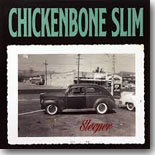 It’s been awhile since I enjoyed
Chickenbone Slim’s 2017 CD, The Big
Beat, so I was excited to run across the San
Diego-based musician’s latest release,
Sleeper (Lo-Fi Mob Records). Like its
predecessor, Sleeper was recorded at Kid
Andersen’s Greaseland Studios in San Jose.
Returning contributors include Andersen,
guitarist Scot Smart, drummer Marty Dodson,
harmonica player Troy Sandow, with Laura Chavez
and former Beat Farmers guitarists Joey Harris
and Jerry Raney all lending a hand here and
there.
It’s been awhile since I enjoyed
Chickenbone Slim’s 2017 CD, The Big
Beat, so I was excited to run across the San
Diego-based musician’s latest release,
Sleeper (Lo-Fi Mob Records). Like its
predecessor, Sleeper was recorded at Kid
Andersen’s Greaseland Studios in San Jose.
Returning contributors include Andersen,
guitarist Scot Smart, drummer Marty Dodson,
harmonica player Troy Sandow, with Laura Chavez
and former Beat Farmers guitarists Joey Harris
and Jerry Raney all lending a hand here and
there.
Sleeper includes ten
songs, all written by Slim (a.k.a. Larry Teves),
and they’re guaranteed to get your blood
pumping. The album begins with the thumping
boogie, “Vampire Baby,” complete with throbbing
walking bass, Slim’s slashing guitar, and
Sandow’s harmonica. The cool old-school rocker,
“Tougher Than That,” picks up the pace a bit,
and “The Ballad of Dick” is the rowdy rockabilly
tale of Country Dick Montana, the late drummer
for The Beat Farmers. “Strolling With
Chickenbone” is a jumping West Coast-styled
instrumental that really percolates.
The mid-tempo “My Bad Luck” has
a swamp blues feel, and “Ride” is a rapid-paced
boogie that really cooks. The acoustic
“Helpless” is an interesting change of pace,
with Slim’s world-weary vocal and contemplative
lyrics. “Little Victory” is a tight blues rocker
that looks at just making it through the day and
looking for a little light at the end of the
proverbial tunnel, and the mid-tempo “Dignity”
just asks that Slim’s soon-to-be ex-lover leaves
him with just a little bit. The funky blues
“These Things Happen” is the album closer.
Sleeper is another winner
for Chickenbone Slim, a cool mix of traditional
and contemporary blues and roots with his retro
sound and progressive songwriting.
--- Graham Clarke
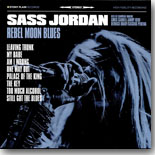 Canadian-based
vocalist Sass Jordan has built a huge
following over her 30+year career, winning the
JUNO Award for Most Promising Female Vocalist
and Billboard’s Best Female Rock Vocalist, and
working as an actress and serving as the lone
female judge on the Canadian version of American
Idol during its six-year run. Her music has
always moved between rock, blues and soul, but
her latest, Rebel Moon Blues (Stony Plain
Records), is her first album to really focus
completely on the blues. Backed by her band, the
Champagne Hookers, Jordan tackles seven blues
standards from various eras of the genre, plus
one original tune.
Canadian-based
vocalist Sass Jordan has built a huge
following over her 30+year career, winning the
JUNO Award for Most Promising Female Vocalist
and Billboard’s Best Female Rock Vocalist, and
working as an actress and serving as the lone
female judge on the Canadian version of American
Idol during its six-year run. Her music has
always moved between rock, blues and soul, but
her latest, Rebel Moon Blues (Stony Plain
Records), is her first album to really focus
completely on the blues. Backed by her band, the
Champagne Hookers, Jordan tackles seven blues
standards from various eras of the genre, plus
one original tune.
The opener, Sleepy John Estes’
“Leaving Trunk,” hews closely to the Taj Mahal
version musically, but Jordan’s growling
delivery kicks things up a notch. Little
Walter’s classic “My Babe” gets a fresh
interpretation as Jordan sings it from a female
perspective, and Keb Mo’s “Am I Wrong,” gets a
lively, stripped-down treatment with Jordan’s
vocals, Chris Caddell’s dobro, and hand claps
for percussion. The Elmore James standard, “One
Way Out,” keeps the Allman Brothers Band
backdrop with layered guitars and a gritty vocal
from Jordan that works really well.
Leon Russell’s “Palace Of The
King,” best remembered from Freddie King’s
torrid ’70s version, is mere putty in the hands
of Ms. Jordan and the guitarists (Caddell and
Jimmy Reid). Next up is the lone original, “The
Key,” a blues ballad with a rock edge penned by
Jordan and her husband, singer Derek Sharp. J.B.
Hutto’s “Too Much Alcohol” gets a slower,
stripped-down treatment with Jordan and
Caddell’s slide guitar , and she really does a
number on this stellar track. The closer is Gary
Moore’s “Still Got The Blues,” with Jordan and
band saving the best for last with the splendid
slow burner.
The Champagne Hookers (Caddell
and Reid – guitars/vocals, Derrick Brady –
bass/vocals, and Cassius Pereira – drums/vocals)
are augmented by harp ace Steve Marriner (MonkeyJunk),
keyboardist Jesse O’Brien, and vocalists Hill
Kourkoutis, and co-producer (with Jordan) D#.
Clocking in at a brief 33 minutes,
Rebel Moon Blues
nevertheless gets a lot said and done in a short
time, and is highly recommended listening for
blues and blues rock fans. Hopefully, Sass
Jordan will give us more of this great music
soon.
--- Graham Clarke
 Sister Lucille, a band
hailing from southwest Missouri, advanced to the
semifinals of the 2015 I.B.C. with their
powerful modern mix of blues, soul, funk, and
R&B. Singer Kimberly Dill and the band (Jamie
Holdren – lead vocals/guitar, Kevin Lyons –
drums/percussion, and Eric Guinn – bass)
released their debut album, Alive
(Endless Blues Records), a little over a year
ago, and it earned them the 2020 Blues Blast
Music Award for New Artist Debut Album.
Listening to the 11-song set of nine originals
and two covers, it’s hard to argue with the
voters who selected it.
Sister Lucille, a band
hailing from southwest Missouri, advanced to the
semifinals of the 2015 I.B.C. with their
powerful modern mix of blues, soul, funk, and
R&B. Singer Kimberly Dill and the band (Jamie
Holdren – lead vocals/guitar, Kevin Lyons –
drums/percussion, and Eric Guinn – bass)
released their debut album, Alive
(Endless Blues Records), a little over a year
ago, and it earned them the 2020 Blues Blast
Music Award for New Artist Debut Album.
Listening to the 11-song set of nine originals
and two covers, it’s hard to argue with the
voters who selected it.
The album kicks off with the
muscular blues rocker, “Won’t Give It,” which
addresses the modern perils of dating. The
mid-tempo title track is Dill’s tribute to
California, mixing soul and funk, with Dill
pouring her heart out on vocals and Holdren
contributng some funky fretwork. Holdren breaks
out the slide and cigar box guitar for the
scorching “See My Baby,” a tough southern rocker
on which he also sings. The Latin-flavored
“Devil’s Eyes” is highlighted by vivid
songwriting and Dill’s steamy vocal, and the
greasy “Wanna Lose You” sounds like a lost
mid-’70s R&B hit.
The album’s first cover is a
smoking remake of Ann Peebles’ “99 Pounds,” with
Dill practically owning this one, her vocal
brimming with sass and brass and the band
raising a ruckus behind her. Eric Hughes guests
on harnonica on the blues burner, “Respect Your
Woman,” while Holdren takes on social media with
the funky rocker, “Fussin’ & Fightin’.” Mark
“Muleman” Massey joins Dill on vocals for the
soulful Memphis-styled “Think About You,”
yielding most impressive results.
The album’s second cover is a
sultry take on Etta James’ “W-O-M-A-N,” and the
album closes with “Lost,” a moving plea for
peace and harmony in the world, sung by Holdren.
Alive is a most excellent
debut release by an up-and-coming band. Sister
Lucille seems to have all of the parts in place
with two talented vocalist (who are also
excellent songwriters) and superb instrumental
support as well. Great things appear to be in
store for Sister Lucille.
--- Graham Clarke
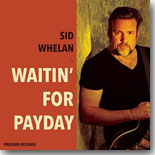 Sid Whelan has studied
songwriting with Steve Earle and Chely Wright,
studied guitar with Woody Mann and Howard Morgen,
and served as lead guitarist for several world
music acts, among them the Lijadu Sisters and
Afroblue. In 2013, he began releasing his own
material, recently issuing his third effort,
Waitin’ For Payday, an eight-song set of
original tunes. Each song acknowledges all of
his musical influences, moving from blues to
jazz, rock, soul, and country.
Sid Whelan has studied
songwriting with Steve Earle and Chely Wright,
studied guitar with Woody Mann and Howard Morgen,
and served as lead guitarist for several world
music acts, among them the Lijadu Sisters and
Afroblue. In 2013, he began releasing his own
material, recently issuing his third effort,
Waitin’ For Payday, an eight-song set of
original tunes. Each song acknowledges all of
his musical influences, moving from blues to
jazz, rock, soul, and country.
The opener, “Nina Simone,” is an
acoustic, jazz-flavored tribute to the singer,
while “Love Me Right” is a gentle country/pop
rocker. The soulful “Make Some Time” adds horns
and a dash of light funk, and “Midnight In The
Country” is gritty, atmospheric electric blues
rock.
Meanwhile, Whelan’s background
in world music is on display on the moody,
percussion-based “Legba Ain’t No Devil” and “The
Promise,” an intriguing track which also adds
jazz and blues into the mix. The title track has
a bit of New Orleans flavor and puts the “fun”
in funky, and the closer, “Break It Down,” shows
that Whelan can play the blues straight and
nasty.
Whelan is an excellent, clever
songwriter. He’s also a fine, expressive singer
and guitarist, and his instrumental support is
first-rate. Waitin’ For Payday is an
interesting and diverse set of blues and roots
that will appeal to blues fans who like a little
extra in their music.
--- Graham Clarke
 The Montreal-based Justin
Saladino Band’s recent release, JSB Live
(Disques BROS Records), is a live recording in a
studio (Piccolo Studios) with a small, intimate
audience. The band (Saladino – vocals/guitars,
Antoine Loiselle – guitars, David Osei-Afrifa –
keys, Denis Paquin – drums/vocals, Gabriel
Forget – bass/vocals, Lucie Mertel –
vocals/percussion) offers ten favorites from
their previous two releases (the 2016 EP No
Worries and 2018’s A Fool’s Heart),
plus one tasty cover, all of which perfectly
capture the band’s solid blues-rock/funk musical
palette.
The Montreal-based Justin
Saladino Band’s recent release, JSB Live
(Disques BROS Records), is a live recording in a
studio (Piccolo Studios) with a small, intimate
audience. The band (Saladino – vocals/guitars,
Antoine Loiselle – guitars, David Osei-Afrifa –
keys, Denis Paquin – drums/vocals, Gabriel
Forget – bass/vocals, Lucie Mertel –
vocals/percussion) offers ten favorites from
their previous two releases (the 2016 EP No
Worries and 2018’s A Fool’s Heart),
plus one tasty cover, all of which perfectly
capture the band’s solid blues-rock/funk musical
palette.
The first three songs come from
A Fool’s Heart, the R&B-flavored rocker
“Take What You Need,” the melodic mid-tempo
“Honey,” and the deliciously funky “Bad Habit.”
Saladino breaks out the slide for the cover of
Tom Petty’s “You Don’t Know How It Feels,”
giving the track an easy, southern rock vibe.
Three more tunes from A
Fool’s Heart follow, all slower tempo
choices --- the smooth ballad “All You Ever
Need,” the reflective “Put The Hammer Down,” and
“Peace With You,” a supreme soul burner.
The stomping blues rocker
“Purple Girl” (from No Worries) kicks things
back into high gear with scorching guitar work,
and the mid-tempo “A Fool I’ll Stay” mixes rock
and funk seamlessly. “Irish Bordello” is a
fast-paced, driving rocker that also features
standout fretwork from Saladino. The disc wraps
up with a bonus track, the title track from
No Worries.
The live setting allows the band
to stretch out a bit on these tunes from their
original versions, and also adds a bit of
spontaneity and energy to the proceedings. The
appreciate audience obviously inspired the band
as well. JSB Live is a great picture of
an up-and-coming band, their previous work, and
their continued development. Definitely worth a
listen.
--- Graham Clarke
 Lightnin’ Rod & the
Thunderbolts recently released Long Road
Back To Eden (Memphis Blues Records), their
first album since 2014’s Guilty of The Blues.
Lightnin’ Rod Wilson is still handling guitar
and lead vocals and he has retained the trio
format, joined by Greg Kitzmiller
(drums/percussion) and Jimmy Seville (bass),
with guests Tommy Cate (harmonica), David Sears
(piano), and Kristi Kitzmiller, Danielle Gross,
and Kaylee Bays (harmony vocals). The new
release includes nine songs, with seven
originals from Wilson.
Lightnin’ Rod & the
Thunderbolts recently released Long Road
Back To Eden (Memphis Blues Records), their
first album since 2014’s Guilty of The Blues.
Lightnin’ Rod Wilson is still handling guitar
and lead vocals and he has retained the trio
format, joined by Greg Kitzmiller
(drums/percussion) and Jimmy Seville (bass),
with guests Tommy Cate (harmonica), David Sears
(piano), and Kristi Kitzmiller, Danielle Gross,
and Kaylee Bays (harmony vocals). The new
release includes nine songs, with seven
originals from Wilson.
The opener, “Kentucky Mojo,” is
one of those spirited blues rockers that Wilson
and band do so well. He is a first-rate
guitarist , with his feisty vocal a great fit.
“Reverend Jones” is a tribute to a late preacher
man who said “No” to the devil and never
relented in his fight against evil, while the
energetic title track admonishes against the
evils of sin individually and collectively.
Meanwhile, the moody “Till The Sun Goes Down”
mixes gospel and the blues with an old-school,
sweaty Mississippi Delta feel, while “Florida
Shore” has a breezy vibe as Wilson opts for
warmer climes.
The two covers appear
back-to-back. First is Bob Dylan’s “Don’t Think
Twice, It’s All Right,” with Wilson’s version
taking the same mid-tempo approach, but the
extra instrumentation is effective. Wilson also
does a fine job on Louis Armstrong’s feel-good
anthem, “What A Wonderful World.” “The Morning
Sun” is a poignant elegy for a recently-departed
pup, and the closer, “I Should Have Seen That
Comin’,” is a tough blues rocker signaling
relief at the end of a relationship.
I enjoyed Lightnin’ Rod’s first
two releases, but haven’t heard any new material
in about 15 years. It’s nice to see that he’s
still making great music. As always, he gets
maximum sound and energy out of the power trio
attack. He’s a powerful guitarist and vocalist
and the rhythm section is spot on. With great
songs and performances, Long Road Back To
Eden, should please fans of blues rock.
--- Graham Clarke
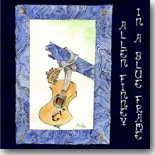 Allen Finney is an
American-born musician/songwriter who has been
based in Sweden over the past 40 years, where
he’s released nine albums, His most recent
effort is In a Blue Frame (Mojo Music),
his second collaboration with Swedish
musician/producer Robert Ivansson, their first
being the well-received 2018 release Salt
Breeze With Kings. Finney wrote all 11 songs
on the album, singing and playing harmonica and
guitar while Ivansson plays bass. They are
joined by a diverse set of musicians on the
tracks, a mix of traditional and contemporary
blues.
Allen Finney is an
American-born musician/songwriter who has been
based in Sweden over the past 40 years, where
he’s released nine albums, His most recent
effort is In a Blue Frame (Mojo Music),
his second collaboration with Swedish
musician/producer Robert Ivansson, their first
being the well-received 2018 release Salt
Breeze With Kings. Finney wrote all 11 songs
on the album, singing and playing harmonica and
guitar while Ivansson plays bass. They are
joined by a diverse set of musicians on the
tracks, a mix of traditional and contemporary
blues.
Finney’s charming vocals are a
highlight on these tracks, and his dry sense of
humor comes through these songs over and over
again via his vocals and lyrics. The opener,
“Cloudy Sky Roll,” is a jaunty old school
country blues that hooks you from the opening
verse. Next is the ominous “My Devil Turns
Around,” replete with twangy guitar and Finney’s
craggly vocal, and “Here I Am at 3 AM,” an
energetic and jumping mix of blues and jazz that
adds tuba to the mix.
The moody “Cold Quarter Moon”
pulls you in so hard with such vivid imagery
that you’ll be able see your breath in the cool
air before the song finishes, and then there’s
“A Guy Named Sly,” a warning about the potential
results of taking your lover for granted.
Felicia Nielsen joins Finney on
vocals for the sentimental ballad. “My Old
Shoes,” which should leave listeners with a warm
feeling inside. Finney plays harp on both “I’m
Glad You’re Gone” and “Goin’ Back To My Gal,” a
pair of mid-tempo number that manage to blend a
bit of country, blues and soul together most
effectively.
The country-flavored “Take the
Change” teams Finney with singer Hanna Francis
on vocals, and the blues rocker “You Ain’t
Funny” jabs people who aren’t nearly as funny as
they think they are when trying to cheer someone
up. The disc concludes with “Walking On,” an
upbeat tune about perseverance through hard
times.
In a Blue Frame is a disc
that any blues fan will enjoy. Allen Finney is
an excellent songwriter whose life experiences
permeate each of his songs and his warm,
weathered vocals pull you in if the lyrics don’t
(but they will). The musical support is first
rate (notably steel guitarist Johan Lindström on
selected tracks) and there’s just plenty to like
about the whole album, so give it a spin.
--- Graham Clarke
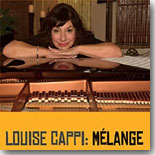 New Orleans-based vocalist
Louise Cappi moves effortlessly between
blues and jazz, mixing in elements of Latin
music, rock, funk, and pop. She’s the daughter
of the late Al Cappi, New York-based jazz
guitarist who was a master of the seven-string
guitar, and she grew up singing on gigs with her
dad and later sang contemporary gospel while in
college. After moving from New York to New
Orleans, she began to perform with area artists
such as Delfeayo Marsalis and Walter “Wolfman”
Washington. Her new album, the appropriately
titled Mélange, includes nine eclectic
tunes, four Cappi originals among them.
New Orleans-based vocalist
Louise Cappi moves effortlessly between
blues and jazz, mixing in elements of Latin
music, rock, funk, and pop. She’s the daughter
of the late Al Cappi, New York-based jazz
guitarist who was a master of the seven-string
guitar, and she grew up singing on gigs with her
dad and later sang contemporary gospel while in
college. After moving from New York to New
Orleans, she began to perform with area artists
such as Delfeayo Marsalis and Walter “Wolfman”
Washington. Her new album, the appropriately
titled Mélange, includes nine eclectic
tunes, four Cappi originals among them.
The first track, Cappi’s ballad
“Talk To Me,” has a slippery Caribbean rhythm
with a nice romantic flair. She covers Randy
Newman’s “Guilty” superbly with a strong but not
overpowering vocal performance. Alex Krahe’s
guitar work is particularly noteworthy on this
track, giving the track a real blues flavor.
Cappi’s treatment of Roberta Flack’s “Feel Like
Makin’ Love” will send listeners back to the
’70s with her sweet vocal and the funky R&B
backdrop (smooth and subtle solos from Krahe and
keyboardist Paul Longstreth.
The charming “Bella NOLA” is
Cappi’s loving tribute to her adopted home city,
her heartfelt vocal is backed perfectly by
Russell Ramirez’s trombone. Next is a cool
medley of Aretha Franklin’s (via Don Covey)
“Chain of Fools” and “Unchain My Heart,” a
soulful mashup with a funky New Orleans twist.
Cappi’s third original, “It Is
What It Is,” is an interesting ballad signaling
the end of a relationship. It’s followed by a
tasty read of the Gershwin’s “Summertime” that
also manages to weave in a tiny bit of Van
Morrison’s “Moondance.”
Cappi’s steamy “Let’s Make Love”
is playful and carefree, and her interpretation
of Leon Russell’s “A Song For You” is stunning,
as she delivers a masterful vocal backed only by
piano from Jenna McSwain.
Mélange is a beautiful
and inspiring set that combines a variety of
musical styles most effectively. Louise Cappi’s
wonderful voice is one that you won’t forget
soon.
--- Graham Clarke
 Richmond, Virginia native
Andrew Alli took up harmonica at age 20,
later than normal for most musicians, but, boy,
did he make up for lost time. The young man took
it upon himself to not only learn to play the
instrument, but also learn the history of the
instrument. In the process he fell in love with
the blues and some of the genre’s legendary harp
masters, such as Little Walter, Big Walter,
George “Harmonica” Smith, Sonny Boy Williamson,
and Junior Wells, among others. At the same
time, he’s taken what he learned from those
legends and managed to incorporate it into his
own unique sound.
Richmond, Virginia native
Andrew Alli took up harmonica at age 20,
later than normal for most musicians, but, boy,
did he make up for lost time. The young man took
it upon himself to not only learn to play the
instrument, but also learn the history of the
instrument. In the process he fell in love with
the blues and some of the genre’s legendary harp
masters, such as Little Walter, Big Walter,
George “Harmonica” Smith, Sonny Boy Williamson,
and Junior Wells, among others. At the same
time, he’s taken what he learned from those
legends and managed to incorporate it into his
own unique sound.
Alli’s debut release for
EllerSoul Records, Hard Workin’ Man, is
as fine a set of traditional Chicago blues as
you’ve heard in a long while. Through the course
of a dozen tracks (nine originals, three
covers), The young harmonica player pays tribute
to the vintage Chicago blues, backed by a band
(Jon Atkinson – guitar/bass, Carl Sonny Leyland
– piano, Danny Michel – guitar, Devin Neel and
Buddy Honeycutt – drums) that come as close as
possible to replicating the classic ’50s Chess/Vee-Jay/Cobra
recordings.
Alli’s original tunes would have
been a perfect fit in the catalog of the
above-mentioned labels, beginning with the
stop-time shuffling title track that opens the
disc, rolling with the boogie on the lively
“Going Down South,” and settling into the
splendid slow blues “30 Long Years.” Meanwhile,
the jaunty “Texas Woman,” and a pair of lively
original shuffles (“Easy Going Fellow” and “So
Long”) are also highlights.
Alli also composed three fine
instrumentals, the lively “AA Boogie,” the
heavy-duty “Chrom-A-Thick,” and “Walkin’ Down,”
the latter which gave me goose bumps because it
sounded so much like those classic tracks I
first loved when I started listening to the
blues.
Alli also covers George
“Harmonica” Smith’s “Good Things,” Big Walter
Horton’s instrumental “Walter’s Sun,” and
“Little Walter’s “One More Chance,” easily
capturing the spirit and tone of the original
versions while adding a dash or flair of his own
to each offering.
Alli’s harmonica skills are
first rate, but his vocals are on the same
level, a perfect match for the vintage setting
of this material. Hard Workin’ Man should
be on the radar of any self-respecting fan of
those good ol’ ’50s-era Windy City blues.
--- Graham Clarke
 In late 2016, Liz Mandeville
was seriously injured in a car wreck, leaving
her with multiple injuries so severe that it was
believed she would never play or perform again.
However, they underestimated the feisty redhead
who battled back slowly, eventually stopping her
pain meds and opting for acupuncture, Chinese
herbs, rehab, and yoga. Four months after the
accident, she did her first gig, and nine months
after the accident she began recording sessions
for her album, Playing With Fire (Blue
Kitty Records).
In late 2016, Liz Mandeville
was seriously injured in a car wreck, leaving
her with multiple injuries so severe that it was
believed she would never play or perform again.
However, they underestimated the feisty redhead
who battled back slowly, eventually stopping her
pain meds and opting for acupuncture, Chinese
herbs, rehab, and yoga. Four months after the
accident, she did her first gig, and nine months
after the accident she began recording sessions
for her album, Playing With Fire (Blue
Kitty Records).
The new release is a
collaborative effort in the tradition of
Mandeville’s previous release, The Stars
Motel, featuring guest artists Dario
Lombardo (Italian guitarist), Dutch guitarist
Peter Struijk, Japanese guitarist Minoru
Maruyama (Mandeville’s regular guitarist),
French guitarist Phillippe Fernandez (Big Dez),
harp player Gilles Gabisson, and American
artists Ilana Katz Katz (violin), Anne Harris
(violin), and Johnny Burgin (guitar). The album
was recorded in five sessions between 2017 and
2019 in Chicago. Mandeville penned the 13 songs
with musical contributions from Dez, Struijk,
Maruyama, Katz, and Lombardo.
The first session on the album,
from July, 2017, teams Mandeville with Lombardo,
Harris, drummers Andy Sutton and Jim Godsey, and
bassist Steve Hart. The opening track, “Bailing
The Titanic,” is a traditional blues shuffle
about attempting to save a doomed relationship.
It’s followed by “Online Love Affair,” a greasy
foray into Memphis-styled soul, and “Everybody’s
Got Wings,” a dreamy, haunting ballad
accentuated by Harris’ violin and Lombardo’s
slide guitar.
The next featured session
(recorded in late 2018) brings together
Mandeville with Maruyama, Sutton, and bassist
Darryl Wright for “Comfort Food Blues,” a
humorous talking blues about the pitfalls of
overindulging, a song we can certainly all
relate to during this time of year. The session
with Big Dez and Gabisson was recorded in June
of 2019, and includes three tracks --- the
boisterous rocker “Keep On Workin’,” the slow
burning Chicago-styled “I Just Cry,” and the
mid-tempo “How Many Times (Do You Get To Break
My Heart).”
The Katz session, recorded in
August 2019, features two tracks --- the
swinging, jazzy “He Loves My Biscuits,” a fun,
double entendre-laced song with Katz adding
fiddle and Mandeville’s husband Carl Uchiyama
contributing backing vocals, and “Just Give Her
Chocolate,” a rockabilly raver that claims to
find the cure for all the world’s problems.
The session with resonator
player Struijk, from February 2018, offers four
traditional blues tracks. “Poor Robert Johnson”
tells the tale of the legendary blues guitarist,
“Joliet Town” is the story of a career criminal
sent to the prison at a young age, and on “Boss
Lady” Mandeville (who was given the nickname
“Boss Lady of the Blues” from drummer Twist
Turner) relates the story of her accident and
her recovery (with an assist from Burgin on
guitar). The final track is “Hey Babe Ya Wanna
Boogie” (credited to John Hammond), a short, but
sweet acoustic tune with pre-war influences.
Liz Mandeville’s latest couldn’t
have a more appropriate title than Playing
With Fire, because she does just that
throughout the album. These are some of her best
songs and she’s never sounded better as a
vocalist or guitarist. It’s true that you can’t
keep a good woman down for long, and blues fans
should definitely be grateful for that.
--- Graham Clarke
 On the singles side this month,
we have a new track from Virginia-based
singer/guitarist Tom Euler, who impressed
last year with his debut solo release, Blues
Got My Back (reviewed in
November
issue of Blues Bytes). Euler plans to
release a pair of singles in advance of a new
full-length album set for 2021.
On the singles side this month,
we have a new track from Virginia-based
singer/guitarist Tom Euler, who impressed
last year with his debut solo release, Blues
Got My Back (reviewed in
November
issue of Blues Bytes). Euler plans to
release a pair of singles in advance of a new
full-length album set for 2021.
The first of these singles is
“Don’t Look For Me,” a hard-charging
Chicago-styled shuffle that adds a bit of Texas
roadhouse boogie to the mix. Euler, who served
as lead guitarist for the Bobby Blackhat band
during the 2010s, is certainly a confident and
assured guitarist, his solo is most impressive
on this track and his vocals are nearly equal to
his fretwork. “Don’t Look For Me” is an
excellent track that will have fans breathlessly
awaiting Euler’s next single and album.
---
Graham Clarke
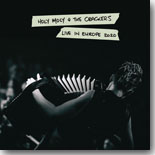 A shot in the
arm as therapeutic as a COVID-19 vaccination,
Live In Europe 2020 (Pink Lane Records) is a
scorching Christmas cracker of an album to
celebrate what will hopefully be the pandemic
blues finale. With several million streams from
major digital music platforms and a highly
engaged, expansive fan base of ‘holy rollers’,
UK’s Holy Moly & The Crackers are hot on
the heels of Eric Burdon, The Animals and
Lindisfarne in establishing themselves as
musical legends in Newcastle upon Tyne. From
quirky, gypsy folksy compositions and Balkan
traditions to the fire and intensity of soul,
blues, indie rock and jazz played with
infectious, irresistible punk energy, these
brilliant, eclectic musicians were born to
entertain with a vengeance. Fortunately for
posterity and not just for Christmas, this
incendiary live set was recorded at the
beginning of the band’s European tour before
coronavirus struck and the concerts were
cancelled.
A shot in the
arm as therapeutic as a COVID-19 vaccination,
Live In Europe 2020 (Pink Lane Records) is a
scorching Christmas cracker of an album to
celebrate what will hopefully be the pandemic
blues finale. With several million streams from
major digital music platforms and a highly
engaged, expansive fan base of ‘holy rollers’,
UK’s Holy Moly & The Crackers are hot on
the heels of Eric Burdon, The Animals and
Lindisfarne in establishing themselves as
musical legends in Newcastle upon Tyne. From
quirky, gypsy folksy compositions and Balkan
traditions to the fire and intensity of soul,
blues, indie rock and jazz played with
infectious, irresistible punk energy, these
brilliant, eclectic musicians were born to
entertain with a vengeance. Fortunately for
posterity and not just for Christmas, this
incendiary live set was recorded at the
beginning of the band’s European tour before
coronavirus struck and the concerts were
cancelled.
Not so much a
band as a true force of nature, charismatic
co-founder, singer and guitarist Conrad Bird
sets the scene with powerful, gritty
blues-drenched vocals on the funk-driven, foot
stomping “Sugar.” For a new audience this is an
unexpected theatrical performance enhanced by a
Chenier-vibe accordion background wash. The pace
ramps up even further with “All I Got Is You”,
once again featuring the squeezebox wizardry of
Rosie Bristow and the finger blurring violin
fretwork of Ruth Patterson. Ruth also shows why
she has succeeded in simultaneously forging a
successful solo career during the past nine
months with her exceptional vocal range, timbre
and cadence.
The first
scintillating axe solo of the evening highlights
what is to come from Nick Tyler’s inventive lead
guitar interludes. Given the band’s American
roots and blues influences combined with Rosie’s
knowledge of rag-time piano, it is not
surprising that “Gravel Rag” was conceived and
interpreted as an excuse for dirty dancing and
hard partying. Its mesmeric bad-ass blues hooks
and riffs are the perfect platform for Patterson
to shred her strings Jimi Hendrix style.
Bristow’s
melodious instrumental, “River Neva,” brings a
Russian dimension with its jigs and Cossack
dancing rhythms leading to a fast and furious
climax. The sheer pace of some of this band’s
material is only possible because of the skills
and fluency of dynamic drummer Tommy Evans and
nimble-fingered bassist Jamie Shields. On “Naked
In Budapest”, Conrad highlights the dangers of
overimbibing local liquor, the increasingly
boisterous fans screaming the anthemic chorus
“We’re not going home.”
Conrad’s
audacious trumpet solo introduces ”A Punk Called
Peter,” a phantasmagoria of strings, accordion
and vocal effects. The barnstorming, mega
Hollywood hit single “Cold Comfort Lane”’
courtesy of Ocean’s 8 soundtrack, raises the
temperature even higher, the audience now
verging on the hysterical. “Devil And The
Danube.” from the band’s debut album nearly a
decade ago. is a nod to the Robert Johnson
legend, Conrad and Ruth taking turns to
communicate the narrative with style and
panache.
The
circus-inspired “Upside Down” is another high
tempo, infectious auditory smorgasbord with all
musicians in perfect synchronization amidst the
vaudeville vibe. The hard rocking 2020 single,
“Road To You,” makes its live debut and proves
to be a sensational showstopper. Sadly, all
parties have to end, this one with “Whiskey
Ain't No Good,” sung by special guest Rob Heron,
leader of the Tea Pad Orchestra.
The whole
evening is a gloriously uplifting, celebratory
omen for a better future.
--- Dave
Scott
 We
get a lot of albums sent our way for review in
Blues Bytes, far more than we have time to
cover, but we try not to overlook a promising
independent artist. One such bluesman is
Chicago-based Justin Howl, whose
self-released
Wanderlust album is
entertaining and shows potential for more. It's
a solo acoustic project, with Howl doing vocals
and playing both guitar and harmonica.
We
get a lot of albums sent our way for review in
Blues Bytes, far more than we have time to
cover, but we try not to overlook a promising
independent artist. One such bluesman is
Chicago-based Justin Howl, whose
self-released
Wanderlust album is
entertaining and shows potential for more. It's
a solo acoustic project, with Howl doing vocals
and playing both guitar and harmonica.
On his
website,
Howl points out that his Mississippi roots
greatly influence his music, especially
displaying the hypnotic North Mississippi style
on the ten original cuts on Wanderlust.
That rhythmic quality comes out on "Times I Been
Good," with a touch of gospel influence. One of
my favorite numbers is "Love Triangle," on which
Howl repetitively sings about relationships that
seem to form more than just a triangle --- :"...
I'm in love with a woman who's in love with a
woman who's in love with a man ..." I'm counting
four souls in that triangle but it doesn't
matter. The vocals are strong and folksy, with
good guitar and harmonica accompaniment,
especially when Howl breaks out a powerfully
dirty harp solo.
"Sweet Babe"
features a call-and-response between Howl's
vocals and harmonica, with an up-tempo Bo
Diddley kind of beat. Howl plays really nice
blues harmonica on the slow blues "Josephina,"
with haunting vocals coming in around the harp
riffs. Howl's rootsy voice is especially
effective on "I Must Confess," framed by rapid
fire harmonica interludes.
I'm glad that
Mr. Howl tracked us down to make sure we gave a
listen to his album, and then sent several
reminders around the time it was going to be
released so that he'd get a timely release.
That's part of how you succeed in the music
business, especially if you pair that business
acumen with a good product. That's what he's got
with Wanderlust.
--- Bill
Mitchell
 Like the rest
of us, Bob Margolin is tired of being
confined to his home instead of being out in
public, in his case playing the blues for his
adoring fans and getting to meet and greet
everyone. Most of us just rant and rave about
the pandemic and the varied responses to it, but
Margolin has put his frustrations into a
six-song EP, Star of Stage and Screens (VizzTone),
and as expected from the venerable Margolin
it's a solid set of music. The recordings sound
very homemade, as expected since they were
recorded in his home with just Bob and his
guitar.
Like the rest
of us, Bob Margolin is tired of being
confined to his home instead of being out in
public, in his case playing the blues for his
adoring fans and getting to meet and greet
everyone. Most of us just rant and rave about
the pandemic and the varied responses to it, but
Margolin has put his frustrations into a
six-song EP, Star of Stage and Screens (VizzTone),
and as expected from the venerable Margolin
it's a solid set of music. The recordings sound
very homemade, as expected since they were
recorded in his home with just Bob and his
guitar.
Margolin's
cabin fever comes out right away on the title
cut, as he calls himself "...a fallen star of
stage and screen ..." while also pointing out
that he's "... Steady Rollin' no more ..." As
expected, we get excellent guitar picking from
Margolin. On "Love and Thanks," he pays tribute
to those who love and support him but then also
to those who have left us.
One of my
favorite cuts is "After Party," on which
Margolin is anticipating the helluva party that
we all are going to have after the pandemic is
over. His vocals work better on the up-tempo
tunes, which is what we get here with his voice
booming out over the guitar. He keeps up the
pace on "Let It Go," adding slide to his guitar
and singing about how we all need to chill out,
take a deep breath and hold our tempers instead
of getting offended by everything.
Margolin pays
tributes to those who have influenced him in his
life on the slow blues, "For My Teachers."
Closing the album is another strong number,
"March 2020 in Stop Time," this time being
critical of the leaders that have allowed this COVID hex to continue for so long. A solid
political statement from a man who is not afraid
to voice his opinion, as we've heard on other
recent Margolin releases.
Star of
Stage and Screens has inspired me in many
ways, but most important in the knowledge that
there will be a big afterparty sometime soon.
Keep the faith and stay healthy!
--- Bill
Mitchell
 The very fine Serbian piano
player / singer / songwriter, Katarina Pejak,
has also released her own EP, Outside Looking
In, a four-song set that definitely shows
her more mellow side with limited accompaniment.
It's more jazzy and smoky music than what we
heard on her outstanding Ruf Records release,
Roads That Cross.
The very fine Serbian piano
player / singer / songwriter, Katarina Pejak,
has also released her own EP, Outside Looking
In, a four-song set that definitely shows
her more mellow side with limited accompaniment.
It's more jazzy and smoky music than what we
heard on her outstanding Ruf Records release,
Roads That Cross.
The single from the album
is "Weeping Wind," a very subdued number with a
slow pace, featuring a nice electric piano intro
before Pejak shares her emotions by singing,
"... I don't want your tears, but I'll sweep
them away ..." Pejak gifts us with a strong
piano intro on the late night jazzy "Silver
Little River," with harmony vocals behind her
later in the song before she launches into
effective scat singing. The opening cut, "Flesh
and Blood," is a slow, ethereal love song with just Pejak on vocals and piano
before she's joined by organ and horns.
I've got mixed feelings
about the strongest cut on this EP, the
mid-tempo, jazzy "Shoot Me Baby." Pejak's piano
playing is very good and her vocals strong as
she tells her man that if he's not going to love
her that he should just shoot her. It's the
shooting part that bothers me, but I'll let you
listen to it and form your own opinion about
whether it's appropriate when there's already so
much violence against women in the world.
Outside Looking In
gives us a small taste of another side of this
very talented artist. If you haven't yet caught
on to the music of Katarina Pejak, I highly
recommend tracking down every single recording
on the market today.
--- Bill
Mitchell
 It's December!
Of course, that means that some artist or record
label is going to release an album of blues
versions of Christmas songs. This year we have
A Gulf Coast Christmas, courtesy of Gulf
Coast Records, with 16 cuts from their deep
artist roster. Overall, there's a lot of good
quality seasonal blues here. Not surprisingly,
my favorites come from artists that I'm already
fond of because of their recent Gulf Coast
releases.
It's December!
Of course, that means that some artist or record
label is going to release an album of blues
versions of Christmas songs. This year we have
A Gulf Coast Christmas, courtesy of Gulf
Coast Records, with 16 cuts from their deep
artist roster. Overall, there's a lot of good
quality seasonal blues here. Not surprisingly,
my favorites come from artists that I'm already
fond of because of their recent Gulf Coast
releases.
One of the
highlights is from exciting and energetic singer
Kat Riggins, who contributes an outstanding
version of "It Ain't Christmas," with a strong
guitar solo from someone in the studio (sorry,
no liner notes included). Kevin Burt follows his
recent top-notch release, Stone Crazy,
with "Please Mr. Santa Claus," although the
sound quality on his vocals isn't quite up to
snuff. Billy Price gives us "Christmas Comes But
Once A Year," done in typical Billy Price
fashion.
Sax player
extraordinaire Jimmy Carpenter provides a
strong version of "Back Door Santa," with good
vocals and a solid horn section. Another keeper
is Diana Rein's version of "Ring The Bells," as
her guitar work on this cut will make you want
to listen to this song even after the holiday season is
over. I'm not familiar with the music of Sayer
and Joyce, but their rendition of "Please Come
Home For Christmas" will have me searching for
more music from the duo, thanks to wonderful
female vocals and strong guitar licks.
Other artists
contributing songs include Mike Zito, Albert
Castiglia, The Proven Ones, Tony Campanella,
John Blues Boyd, Mark May & Miss Molly, LeRoux,
Thomas Atlas and Odds Lane.
A Gulf
Coast Christmas makes a nice stocking
stuffer for all of us. Happy Holidays to all!
--- Bill
Mitchell
 The music
career of multi-instrumentalist Andy Cohen
dates back to the 1960s folk revival, and with
more than a dozen country blues albums to his
credit it's surprising that he isn't
better-known on the blues circuit. I guess
that's my way of saying that I wasn't very
familiar with the man. Making up for lost time,
the Memphis-based Cohen has released two albums,
with a total of 30 songs on the pair of discs.
The music
career of multi-instrumentalist Andy Cohen
dates back to the 1960s folk revival, and with
more than a dozen country blues albums to his
credit it's surprising that he isn't
better-known on the blues circuit. I guess
that's my way of saying that I wasn't very
familiar with the man. Making up for lost time,
the Memphis-based Cohen has released two albums,
with a total of 30 songs on the pair of discs.
Tryin' To
Get Home (Earwig Music) contains 17 acoustic
gems, with Cohen playing solo on all but one
cut. In addition to entertaining the listener,
Cohen takes on the task of educating us with
detailed histories of each song in the liner
notes. He mostly plays acoustic guitar and
sings, although at times he picks up a 12-string
guitar or a steel guitar, as well as sitting down at the
piano for two cuts (very fine honky tonk
keyboards on "Louis Jay Meyers Memorial Stomp"
and "Time To Go"). He's a very good
fingerpicking guitarist, with a decent voice
albeit with not a lot of range.
I especially
like Cohen's treatment of his own ragtime
number, "Puffin' That Stuff," with some of the
nicest guitar picking I've heard in a while. A
similar style of ragtime blues is heard on the
instrumental, "Reverend Gary Rag," in honor of
Rev. Gary Davis. Another favorite is Cohen's
salute to another influence on "Bob Dylan's
Dream," performed on a baritone 12 strong
guitar. He also romps away on the fingerpicking
instrumental, "Earwig Stomp."
Cohen goes
way, way back for the novelty risqué number, "I
Ain't Gonna Give You None Of My Jelly Roll."
recorded in 1958 by Louis Armstrong, and then
he's joined by Randy "Da Bones Man" Seppala on,
what else, the bones, on an early Blind Blake
song, "West Coast Blues." Cohen's fingers fly
across his guitar strings in rapid fashion on
this one.
The other
release from this prodigious musician is
Small But Mighty (Earwig Music), credited to
Andy Cohen with Moira Meltzer-Cohen.
Cohen has a large family with plenty of
offspring, and this album collects a baker's
dozen traditional numbers that he's sung and
played for his children, grandchildren and other
small folk over the years.
Cohen brings
back "West Coast Blues," "Reverend Gary Rag,"
and the train song "Talkin' Casey" from the
Trying' To Get Home album. Daughter Moira, a
very pleasant singer, does the lead on two cuts
---
"Gravy Waltz," one that her dad sang to her as a
child, and "Funnel Cakes," a song that Cohen would
often sing at festivals in hopes of scoring a
free treat from the appropriate food vendor.
Cohen plays banjo on this ode to his food
craving.
Small But
Mighty is Cohen's heartfelt gift and tribute
to the people that mean the most to him. You may
not be personally acquainted with Andy Cohen,
but you'll feel his love and affection through
his music.
--- Bill
Mitchell
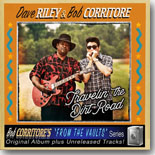 Travelin'
The Dirt Road (SWMAF/VizzTone) re-issues an
out-of-print album from 2007 by Dave Riley &
Bob Corritore, with two previously
unreleased cuts added. This one is part of
Corritore's 'From The Vaults' Series that also
include recent albums featuring Kid Ramos and
Henry Gray, with the Riley/Corritore recordings
dating back to three sessions from 2005-2006. In
addition to Riley on guitar and Corritore on
harmonica, other backing musicians include
Johnny Rapp (guitar), Matt Bishop (piano), Dave
Riley Jr. (bass), the late Paul Thomas (bass)
and Blues Bytes contributor Tom Coulson (drums).
These lineups give the dozen songs, ten of which
are Riley originals, kind of an urban feel to
Riley's
Arkansas country blues sound.
Travelin'
The Dirt Road (SWMAF/VizzTone) re-issues an
out-of-print album from 2007 by Dave Riley &
Bob Corritore, with two previously
unreleased cuts added. This one is part of
Corritore's 'From The Vaults' Series that also
include recent albums featuring Kid Ramos and
Henry Gray, with the Riley/Corritore recordings
dating back to three sessions from 2005-2006. In
addition to Riley on guitar and Corritore on
harmonica, other backing musicians include
Johnny Rapp (guitar), Matt Bishop (piano), Dave
Riley Jr. (bass), the late Paul Thomas (bass)
and Blues Bytes contributor Tom Coulson (drums).
These lineups give the dozen songs, ten of which
are Riley originals, kind of an urban feel to
Riley's
Arkansas country blues sound.
The album
starts with one of its strongest cuts, the
up-tempo 12-bar blues "I'm Not Your Junkman,"
with a strong harp solo from Corritore and a
killer guitar break from Rapp. Riley's gravelly
vocals are especially effective on this number,
leading into the title cut, a mid-tempo shuffle.
Riley's vocals
are even more effective on "My Baby's Gone," as
he growls out the lyrics while Corritore lays
down some of his best harmonica work here. "Way
Back Home" is another standout, as Riley
builds into more of a shouting vocal style, Corritore
again lays down some solid harp riffs, and Rapp
treats us to another good guitar solo.
Moving into a
different blues style, "Come Here Woman" has
Riley pleading to that woman on a slow, plodding
blues with Rapp again laying down a very tasty
guitar solo. Equally effective is the swampy
country blues, "Voodoo Woman, Voodoo Man,"
with Corritore blowing nice blend of Chicago-
and Louisiana-style harmonica while Bishop
subtly contributes tasteful piano.
The
previously-unreleased lrecordings on Travelin' The Dirt Road are
the mid-tempo 12-bar blues, "Country Tough," and
the Elmore James-sounding "Friends."
Corritore has
a wealth of recordings that he's made with
dozens and dozens of artists over the years, so
expect more albums like this one coming down the
road. I'll certainly be looking forward to them,
but for now I'm enjoying Travelin' The Dirt
Road, and so will you.
--- Bill
Mitchell